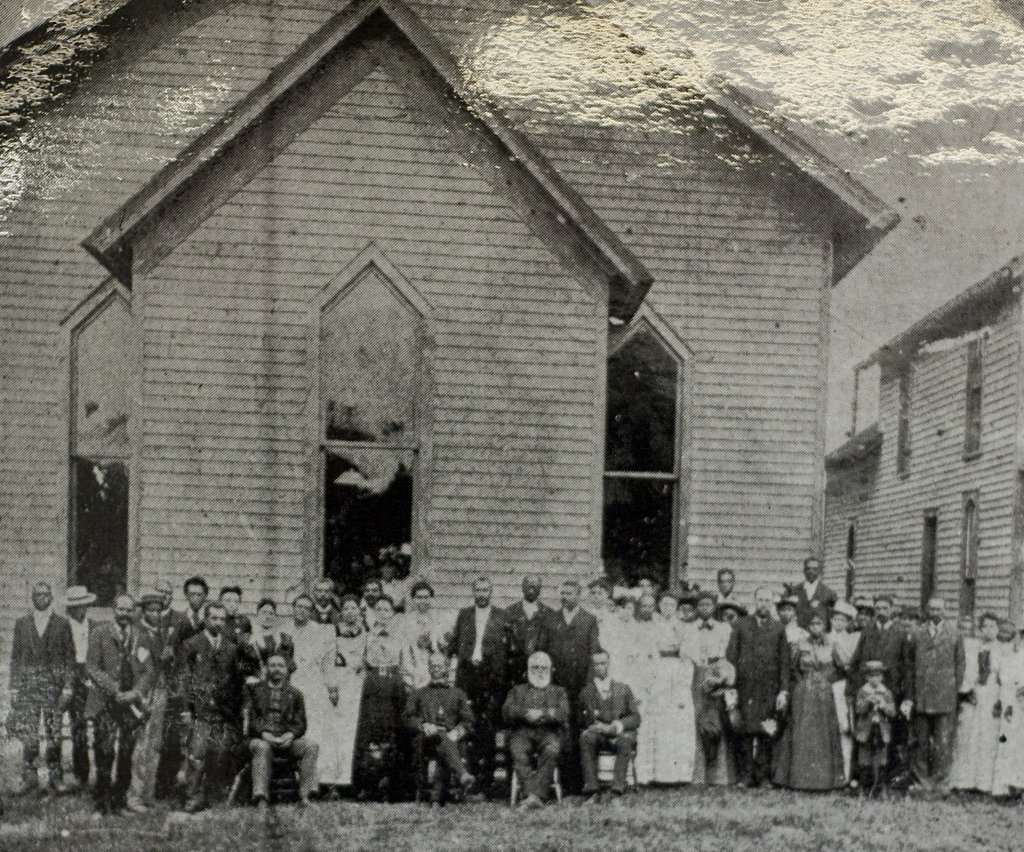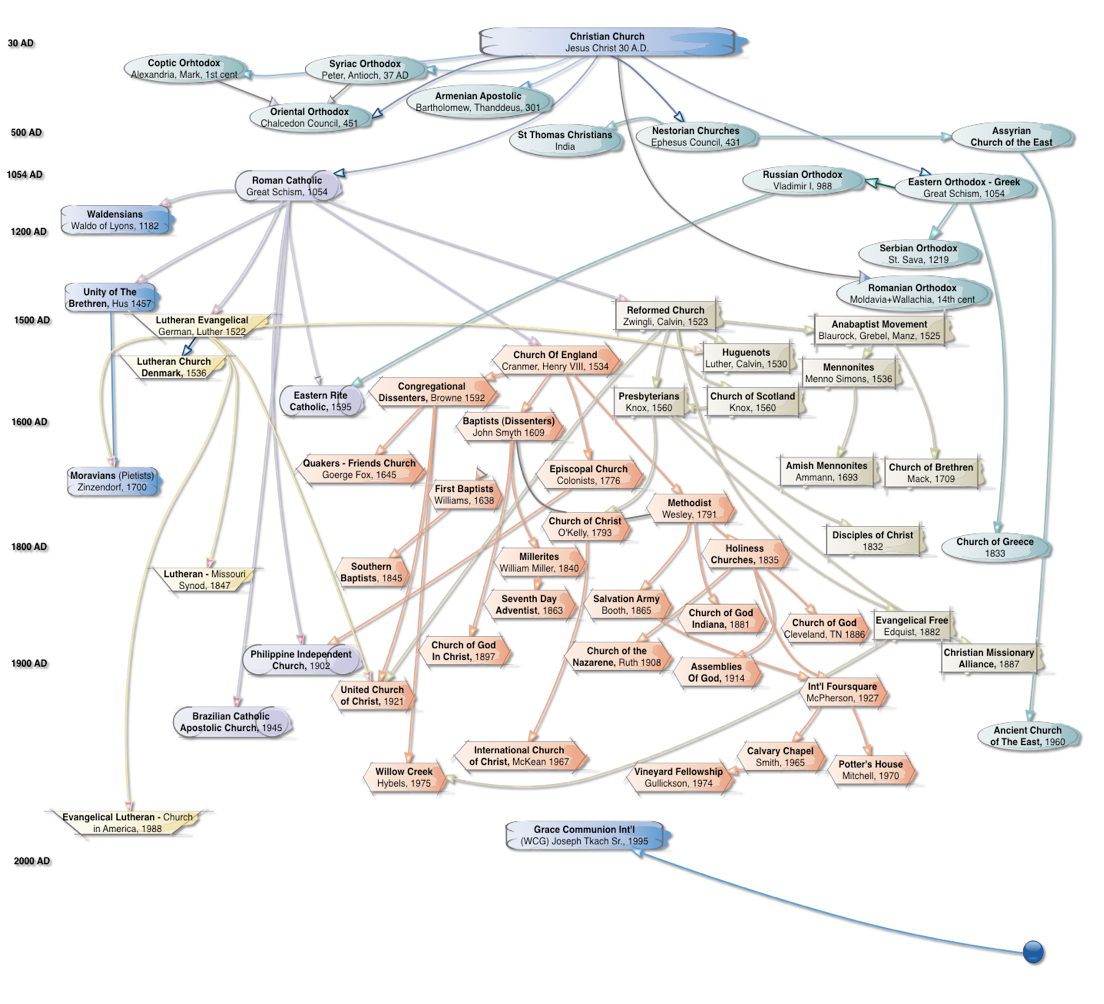Personally, I tend to mentally envision Christianity into six superclasses: the Orthodox family (including Eastern Orthodox, Oriental Orthodox, and other ancient eastern churches), the Catholic family (including Catholics in communion with Rome as well as breakway groups), the Anglican/Lutheran community of liturgical, historical, and conservative Reformation churches, the Reformed Calvinist and Reformed anti/post-Calvinist groups (including groups repudiating specific Reformed/Calvinist doctrines, like dispenastionalists rejecting covenant history, Arminianism rejecting Dortrecht, and Baptist groups rejecting paedobaptism, but retaining the overall structure of Reformed theology, plus Wesleyans/Methodists) which I generally understand to be the core of Protestantism, Anabaptists and primitive restorationists, and modern restorationists like the Campbelite/Churches of Christ, Pentecostals, and Adventists..
If I may ask,
Although I agree with your distinctions as they're very good categorizations, I would wonder where things would fit such as the Black Church - how would they be categorized.
Growing up within it, I've seen a lot of instances where it seems people discuss the historical church - and yet never consider how it has a very different historical trajectory than many of the other branches....especially as it pertains to things such as Liberation theology.

For you had one side reading the book in gaining inspiration (and justification) against tyranny of the British Empire when it came to the American Revolution (as they saw it) while the American Black slaves saw the Exodus as a book proclaiming God's Freedom and a book inspiring them to flee from enslavement - with many slave masters condemning them even as they praised Exodus in their support for the American Revolution when they prided themselves as patriots. And although Exodus had applications that applied to both groups, one group would tend to deny the other the right of interpretation if it went against their interests. Kenneth Chelst, a distinguished academic, and a wide-ranging and profound scholar of Jewish thought has produced a compelling /original study on the issue that blessed me a lot - entitled
Exodus and Emancipation: Biblical and African-American Slavery ( more
here,
here and
here/
here).
This is something that I don't think we can avoid if being honest on the history of how groups tended to develop into their own entities. ...we see the same thing with others who are hard to classify - people coming to mind being others like
Nat Turner.
There's a
reason Nat Turner's theology was the way it was (more
here,
here and
here/
here/
here)....Numerous black slave rebellions and insurrections took place in North America during the seventeenth, eighteenth, and nineteenth centuries. There is documentary evidence of more than 250 uprisings or attempted uprisings involving 10 or more slaves. Three of the best known in the United States during the nineteenth century are the revolts by Gabriel Prosser in Virginia in 1800, Denmark Vesey in Charleston, South Carolina in 1822, and Nat Turner in Southampton County, Virginia, in 1831. If studying African-American History, one will quiclly recall many of the Slave Revolts that often happened—-with
ones like the Nat Turner slave rebellon being amongst the most famous since he was trying to get freedom at all costs…and led a revolt in Virginia on August 21, 1831 that resulted in 56 deaths among their victims, the largest number of white fatalities to occur in one uprising in the antebellum southern United States. And there were others as well - some done by white men who wanted to help the blacks get freedom at all costs....like John Brown's rebellion and the deaths he caused.
White abolitionist John Brown had already fought against pro-slavery forces in Kansas for several years when he decided to lead a raid on Harpers Ferry, Virginia (West Virginia was not yet a state). And this raid was a joint attack by former slaves, freed blacks, and white men who had corresponded with slaves on plantations in order to form a general uprising among slaves. It almost succeeded, had it not been for Brown's delay, and hundreds of slaves left their plantations to join Brown's force, and others left their plantations to join Brown in an escape to the mountains. Eventually, due to a tactical error by Brown, their force was quelled. Nonetheless, but directly following this, slave disobedience and the number of runaways increased markedly in Virginia.
Some would say that he AND others like him were “terrorists”—and yet, one can understand how he arrived at that point after seeing attrocities like the raping of their families, kidnapping, ruthless whippings and many other evils. But you rarely - if ever - hear of their schools of theology discussed....as if they're not even in the discussion for Protestant worldviews that have developed and worth seeing where they belonged...
Whenever it comes to discussing Historic Protestant vs Modern Protestant debates, I do think we have to factor in the culture factor - for ethnicity and culture have often led to SIGNIFICANT gaps in understanding the ways that groups operate and engage with one another.....Protestant culture for Blacks being radically different many times from how Caucasians/Whites lived it out....and what's seen to be normative in one group being far from how other groups see it.
Within the Black Church, the founder of Wesleyan thought ( John Wesley ) has always been one of the most celebrated individuals...and to be more specific, where he's celebrated is within the one of the branches within Methodism that's connected with holiness denominations holding to the teachings of John Wesley. Probably one of the greatest reasons he's celebrated is due to his fighting against slavery in an era when many either remained silent or took no action when disliking the fact that slavery existed. Alongside that reason for why many blacks love him is the other reason of how involved he was in social justice/reform movements, be it with reforming the ways prisons operated or reforming the way that child labor laws operated.
Of course, for those churches within the Holiness Movement associated with John Wesley, it has been the case that there has often been what can be seen as legalism on some things. Others disagree, especially as it comes to the issue of cultural concessions...especially in the realm of Hip Hop (i.e. Rap, MCeeing, Graffiti, Dancing, Spoken Word/Poetry, etc) and many other things connected to /Urban culture.
Because of this, many in the Black church have been in civil war on a host of issues...and the Holiness churches have been one of the main ones leading the way - in many respects similar to previous movements in the Early Church that were advocating for separation from what was deemed "worldliness" and vain expressions (even though those movements would've been within Eastern Christianity and Non-Protestant thought)....
For a good review on the issue, one may wish to consider going online and looking up an article under the name of
"The Dunamis Word - What Does 21st Century Holiness Look Like?" . The article is made by a man named Pastor Harvey Burnett. He's a wonderful man of God whom I've always loved talking with. For he's one whom I used to blog with years ago on another site....and he's also very knowledgable of many of the backgrounds concerning the Black Church as well as Church History in general.
To see the ways the Methodist movement impacted the Black Church has always been fascinating to me ......and with the classification of it, I do wonder why it seems to be often neglected.
I shared this with another recently as it concerns the history behind the Black Church - as
history of the Black Church (more shared on it in
#229 - as well as the history of blacks in the OT/NT in #
14 /#
16 ) - is a multifaceted reality and not something that's in any way monolithic....especially when considering the dynamic of intercultural connections and splicing of cultures:
To me, I always find it amazing when going back and considering the extensive amount of ways that the slaves, in their example, were so in line with the Spirit of how things were done in the Early Church /Ancient Faith.....and what the prophets of the OT/NT preached on when it came to suffering for the Lord/righteousness and looking unto Him for deliverance. The book
An Unbroken Circle: Linking Ancient African Christianity to the African-American Experience (more
here) is one of the
best historical reads present (if not the best) which helps to break that down - by
Fr Moses Berry (
curator of the Ozarks Afro-American Heritage Museum and rector of
Theotokos “Unexpected Joy” Orthodox Church in Ask Grove, Missouri).

Upon its publication in 1997,
An Unbroken Circle: Linking Ancient African Christianity to the African-American Experience, broke new ground in Orthodox writing. And many people have found this book to be an invaluable resource, both for personal growth and for Orthodox outreach as well as general understanding of the ways the Body of Christ came together....

But outside of seeing the ways that Blacks were connected to Eastern Christianity, within American culture it often seemed that Black churches had a very distinct categorization from other groups when it came to the ways they lived out their own faith.
Why I Sing Amazing Grace: The African-American Worship ExperIENCE
The History of The Black Church - The Beginning










